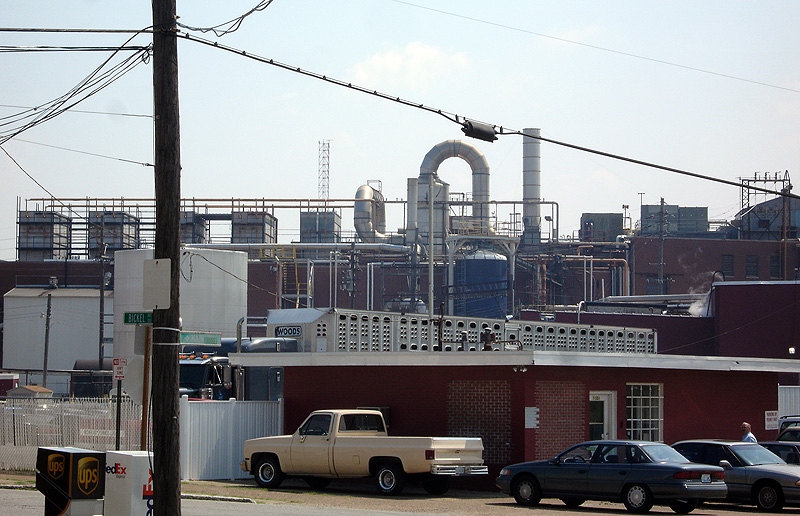
The New York Times ran an interesting story on Friday that mirrors a perennial struggle in Louisville: industry in evolving neighborhoods. Many of New York’s most fashionable neighborhoods—Soho, Tribeca, Dumbo, and the Meatpacking District—were full of industrial uses, not the fashionable boutiques you see today.
Greenpoint, Brooklyn, however, is facing the challenge of industrial-to-residential transition today, a battle Louisville still hasn’t gotten its head around yet. It seems a chicken slaughterhouse is causing the stink:
“It smells like death, like rotting garbage, like rotting flesh,” said Mr. Rodgers, 40, a certified public accountant who moved into a $2,650-a-month, two-bedroom duplex in October, and is seeking to move out. “You can hear the chickens clucking and screaming and the truck guys cursing and carrying on. These guys are delivering chickens to a slaughterhouse. It’s not exactly Goldman Sachs.”
Thoughts?



To start with its a slaughterhouse for hogs, not chickens. That area has many people who have chickens in their backyards (local ordinances allow you to have up to 5). Secondly it was there a long before any of the people who are complaining about the smell, they knew what they were getting into when they moved in (much like residents in the Rubbertown area). If everybody had their way and we ran off all of the industry they would then be complaining about no jobs! Louisville and America need manufacturing jobs to continue to thrive. Unlike what many politicians want us to believe we can not be a great city or country without manufacturing, service industry jobs just don’t get it in the long run because they produce nothing of value. Just look at our trade deficit, most of it is due to the fact that we import items we no longer manufacture in America!
First let me quickly clarify since the previous comment seems to show a mis-reading of the post. The slaughterhouse in Greenpoint that is being referring to by the NYTimes article is indeed a chicken slaughterhouse (I think the commenter is failing to separate the two correlated examples and has confused/combined the defining details?). My husband and I recently moved to Louisville after a decade in Brooklyn and although we never lived in Greenpoint many of our friends do (or did at some point). One close friend lived across the street from the slaughterhouse, which still had an entrance designated as the ‘live chicken pick-up window,’ presumably to serve the many Brooklyn households who still like to kill their own chickens as they typically would have done before moving to the states. Our friend did experience some problems with the smell, particularly a growing paranoia that it was leeching into her clothing (unconfirmed but still disturbing!). Ultimately, her attitude was that she knew the slaughterhouse was there when she chose the apartment, she understood that proximity as a major reason for the affordability of her rent, and in her mind it was up to her to cope with the smell and/or move when her lease came up. FYI: she moved. That said, while living there she just accepted the slaughterhouse as something that pre-existed her move to the city by significantly more than her lifespan…and would never presume to imagine it should be closed just to keep her silk dresses from getting a little stinky.
Regarding our own little stinkpot: I don’t live in Butchertown but drive past the Swifts plant twice a day on my way to and from the Mellwood Center…and for my own part I literally can’t imagine ‘just toughing it out’ like my friend did with the chickens. To be fair, the pork stink trumps the chicken stink by quite a wide measure, but I’m a little sad that I know I’d never have what it takes to live in constant battle with my senses.
I realize I’m not taking on the political aspects of this highly politicized question. Just talking straight-up hardcore STINK…which, at the end of a day when you’re about to sit down to a nice meal just when the breeze wafts a floating banner of pork/feces/urine/death/char odor through the window and across the dinner table…kind of has more immediacy than politics. Anyone get what I’m saying?
the major problem regarding the stink in butchertown is that contemporary americans have lost our tolerance for the wide range of odors that were common in earlier centuries and were a natural part of both city and country life. now we either expect NO smell or some trumped-up chemical-created aroma of baking cookies or citrus breeze.
having grown up in a rural area, lived in smelly new orleans for a while, and then the warehouse district outside downtown minneapolis, the couple of years i spent living in butchertown were really no big deal: the smell is part of the identity of the place, part of what distinguishes it from other neighborhoods. we learned to parse the smells, guessing what winds were drifting our way each day: sometimes syrupy sweet, sometimes pork chops!
too bad when we wanted to buy in butchertown because we loved it so much, everything was too expensive for us. those folks who could afford it are probably now the ones complaining.
i won’t defend stink that’s actually harmful: if rubbertown manufacturing is causing health problems for residents who can’t afford to move away from it, it needs to be handled differently. if anything swift is doing turns out to be harmful, same thing. but if butchertown’s *harmless* smell isn’t pleasant for those who would come into the neighborhood, oh well.
Are you a polar bear?@archintent –